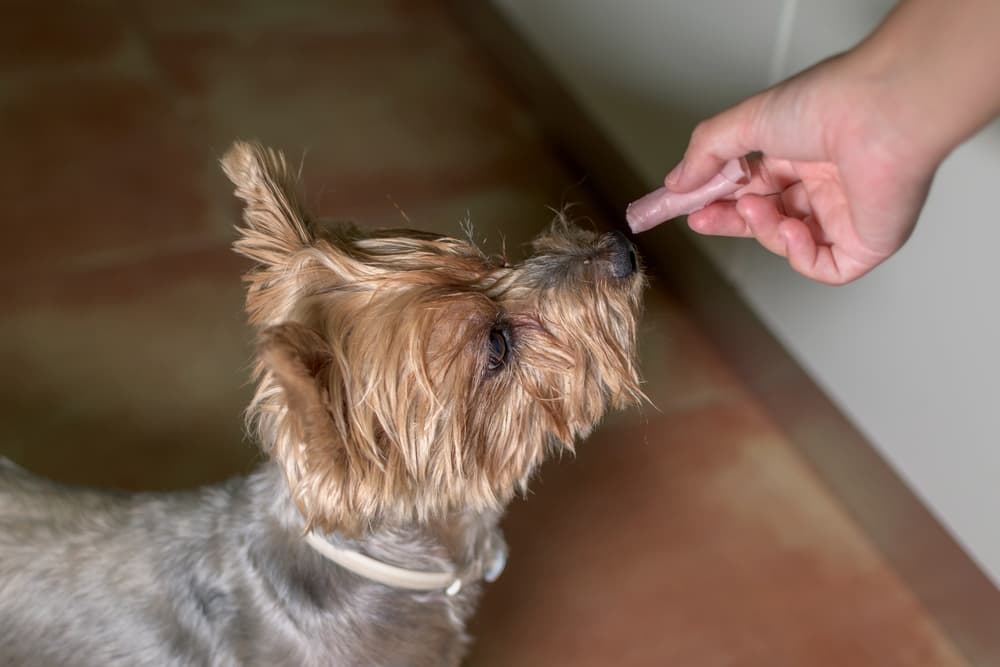Can Dogs Eat Ham?

From sandwich staple to holiday feast centerpiece, ham is a versatile protein that many people enjoy. But make sure to think twice before offering to share some with your dog. While it may be hard to say no to their adorable begging eyes, you should know the risks of feeding dogs ham. Continue reading to find out more about feeding ham to your dog.
Can Dogs Eat Ham?

Feeding ham to dogs is not a good idea. Ham is a pork leg that has been cured in salt and often sugar and other spices. This food is also high in fat and calories. For these reasons, pet parents should not feed their dogs or puppies ham.
Can Dogs Have Ham That’s Fresh, Cured or Smoked?
Ham comes in many different varieties, such as honey ham, jamon Iberico, prosciutto, and smoked ham. None of these types of ham should be fed to dogs.
While most hams are cured in salts or sodium containing nitrates, fresh hams are uncured pork leg cuts. Fresh hams are lower in sodium content than their cured counterparts but still typically contain much more sodium than turkey breast or chicken breast and should also not be included in your dog’s diet.
Most types of hams often contain high amounts of fat, which can also be harmful to dogs.
Can Dogs Eat Ham Bones?
Dogs should not eat ham bones. If the bone is hollow, it may get stuck on your dog’s lower jaw, requiring an emergency trip to the vet.
Cooked ham bones become brittle and can splinter in your dog’s mouth, throat, stomach, or intestines. This can cause severe pain and could lead to a blockage in the digestive system or, worse yet, a tear in the stomach or intestines.
Raw ham bones also carry risks. While they are unlikely to splinter, the bones are very hard and can hurt your dog’s mouth or crack a tooth. Raw ham bones may also carry harmful bacteria like Salmonella, Listeria, or E. coli, which may lead to vomiting and diarrhea that may sometimes become severe.
Can Dogs Eat Deli Ham?
In general, dogs also shouldn’t eat deli ham. Whether it’s prosciutto, honey ham, or turkey ham, sliced and deli hams like most types of hams are too high in sodium and may be high in fat. A tiny bit here and there probably wouldn’t hurt, but there are definitely better treat options for your dog that are healthier and less likely to cause an upset stomach.
Is Ham Bad for Dogs?

Cured meats like ham are high in salt, which can be harmful to dogs. If your dog is fed a commercially prepared complete and balanced diet, their diet already contains all the sodium that they need. Adding in ham in any significant amount can lead to excess sodium, which can lead to bloating, increased water intake, and an upset stomach. Dogs who eat too much ham can potentially experience life-threatening salt poisoning, however, this is very unlikely to occur unless they do not have access to plenty of fresh water.
Another reason why ham isn’t a good choice for dogs is its fat content. Most hams are quite high in fat, which at minimum may upset your dog’s stomach but at worst could lead to a potentially deadly condition called pancreatitis. Some dogs with underlying health issues, such as diabetes, are more sensitive to added fats in their diets and are at a much higher risk of developing pancreatitis. Certain breeds of dogs, especially Miniature Schnauzers, are prone to pancreatitis and should never be fed ham or any other fatty foods.
Many hams, especially the wet hams commonly found in the United States during the holidays, contain added sugars that can be detrimental to your dog’s health.
Risks of Feeding Ham to Dogs

Consider these risks before feeding a dog ham:
- While ham is not toxic to dogs, most varieties contain too much fat, salt, and/or sugar for dogs, which can have a variety of harmful health consequences.
- The most common side effect of feeding your dog ham would be that it can cause an upset stomach, leading to vomiting and diarrhea. This upset stomach can become more severe and lead to dehydration or pancreatitis.
- As a reminder, there are many risks that come with feeding dogs ham bones, cooked or raw, so these bones should never be fed to any dog. These risks range from choking to intestinal blockages and even death.
- Even if your dog tolerates being fed ham in the short term, feeding ham over a long period of time can lead to your dog becoming overweight or obese. This is because ham is high in fat and calories and these extra calories can really add up, especially in small dogs, as their calorie requirements are very low.
- Feeding sweetened ham to dogs frequently can also lead to tooth decay.
- Many varieties of hams also contain nitrates, which are known carcinogens, meaning they promote cancer. For this reason, feeding ham on a daily or frequent basis can increase your dog’s risk of cancers.
What to Do if Your Dog Eats Ham

If you’re reading this and you have fed your dog ham in the past and they are currently acting healthy, there is no need to go running to your veterinarian. However, you shouldn’t continue feeding your dog ham for the reasons previously stated.
If your dog is going to develop an issue from eating ham, they will typically start showing signs of illness within one day. Your dog will be at greatest risk of developing illness from eating ham if they eat a large amount. The smaller the dog, the smaller amount of ham they need to eat to cause them to be sick. If your dog eats a large amount of ham, this should be treated as an emergency and you should take them to the vet right away. Your veterinarian may induce vomiting if the ham was ingested less than two hours prior. If it has been longer than two hours, your veterinarian will likely perform blood work and put your dog on intravenous (IV) fluids and anti-nausea medications and keep them hospitalized for observation.
If your dog swallowed any amount of a ham bone, they should also be taken to their veterinarian immediately. Your veterinarian will need to take X-rays of your dog’s throat, stomach, and intestines to check for signs of a blockage or perforation of the intestines.
However, dogs who have only eaten a small amount of ham may do just fine but should be monitored carefully at home. When in doubt, if you are worried about the amount or type of ham your dog ate, it is always best to reach out to your veterinarian or animal poison control for guidance. Signs that your dog may be seriously ill from eating ham include:
- Not wanting to eat for longer than a day
- Not wanting to drink water
- Vomiting more than a few times in a day
- Explosive or bloody diarrhea
- Crying when you touch their belly
- Acting very tired or listless.
If any of those signs develop, you’ll need to take your dog in for medical care urgently.
How to Prevent Dogs From Eating Ham

In order to prevent your dog from sneaking a slice of ham, make sure to put food trays and plates up high and out of reach from your dog. You should also make sure that your dog does not get into the trash. Trash cans with heavy lids and those that your dog cannot knock over are best to prevent them from access to leftovers. You can also secure ham bones and scraps in the freezer until trash day if you’re worried about your dog getting into the trash.
If you absolutely must share bits of your meals or ingredients with your dog, there are safer alternatives to feed than ham. These include turkey breast without any skin or spices, plain cooked pumpkin or squash meat, raw or steamed unseasoned green beans, and fresh or frozen unsweetened cranberries.









